/sub-categories/research-papers
Research Papers
Stemming the tide - Relief, reconstruction and development in coastal Andhra Pradesh – A report by Aga Khan Development Network
Posted on 05 Aug, 2011 02:35 PM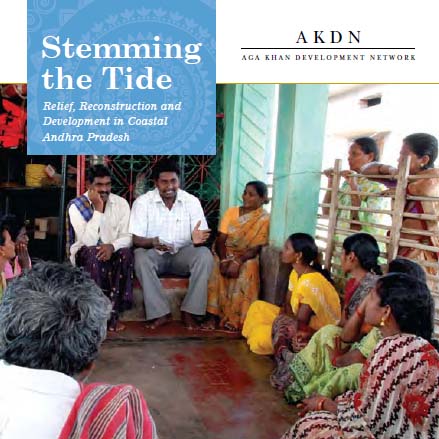 Its aim aim was to improve the capacity of target communities to better manage in times of disaster. To set in motion a process that would sustain a short-term project, the Aga Khan Development Network drew on guiding principles developed from its experiences of projects in disaster reconstruction and more comprehensive development programs: high-quality community-based interventions, working on multiple fronts, and fostering linkages with strong institutional partners.
Its aim aim was to improve the capacity of target communities to better manage in times of disaster. To set in motion a process that would sustain a short-term project, the Aga Khan Development Network drew on guiding principles developed from its experiences of projects in disaster reconstruction and more comprehensive development programs: high-quality community-based interventions, working on multiple fronts, and fostering linkages with strong institutional partners.
At the core of the project’s disaster management and mitigation strategy was the creation of empowered and highly motivated community-based organizations; their participation was critical in shaping and implementing initiatives that would best serve the needs of the vulnerable, particularly women and children.
Wetlands conservation and sustainable management in the Nilgiris - Final project report and local management plan by Keystone Foundation
Posted on 02 Aug, 2011 07:48 PM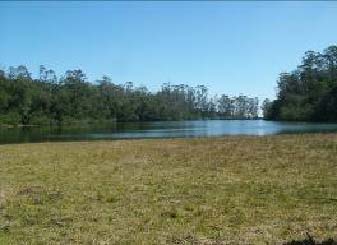 The initiative on hill wetlands in the Nilgiris Biosphere Reserve is supported through this. The area is located at the junction of the Eastern Ghats and the Western Ghats, or Sahyadris, the two prominent mountain ranges that run almost parallel to the coastlines of Peninsular India and is home to indigenous forest people and is a rare repository of mountain biodiversity.
The initiative on hill wetlands in the Nilgiris Biosphere Reserve is supported through this. The area is located at the junction of the Eastern Ghats and the Western Ghats, or Sahyadris, the two prominent mountain ranges that run almost parallel to the coastlines of Peninsular India and is home to indigenous forest people and is a rare repository of mountain biodiversity.
The Nilgiris is home to unique wetlands that are the source of sustenance of numerous animals and human communities. Wetlands are among the more important reservoirs of biodiversity that nature has painstakingly crafted over millions of years.
Troubled waters - Climate change, hydropolitics and transboundary resources – A report by TERI and The Henry L Stimson Center
Posted on 02 Aug, 2011 07:38 PMThis report is a part of Stimson’s Regional Voices: Transnational Challenges project and provides valuable cross-regional and multidisciplinary insights into the complex issues surrounding transboundary water resources and climate change. It examines the environmental dangers and policy dilemmas confronting the sustainable management of shared water resources in a warming world.
Role of cyclones and other factors in the decline of the ports of northern Orissa - Current Science
Posted on 30 Jul, 2011 01:23 AM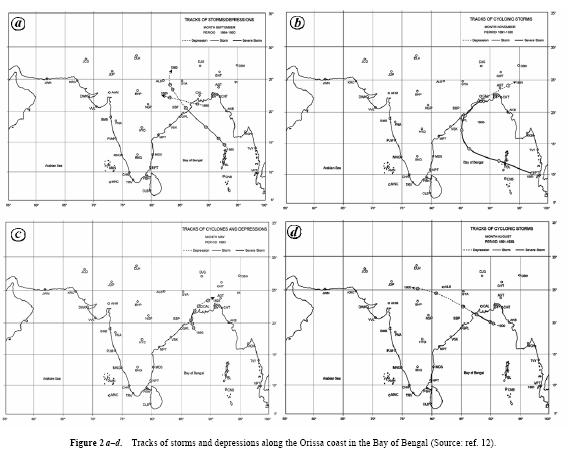 This article published in Current Scienc
This article published in Current Scienc
Sustainable Development Framework for the mining sector in India – A report by the Ministry of Mines
Posted on 29 Jul, 2011 01:03 PM It does this in light of the recommendations of the Anwarul Hoda Committee, a High Level Committee set up by the Planning Commission in 2005. The draft SDF prepared by ERM India Pvt. Ltd. for the Ministry of Mines was released recently for seeking public comments before its formal adoption. It presents a set of guiding principles for the mining sector in India, which aims at achieving resource efficiency, business viability and environment stewardship around development of affected communities.
It does this in light of the recommendations of the Anwarul Hoda Committee, a High Level Committee set up by the Planning Commission in 2005. The draft SDF prepared by ERM India Pvt. Ltd. for the Ministry of Mines was released recently for seeking public comments before its formal adoption. It presents a set of guiding principles for the mining sector in India, which aims at achieving resource efficiency, business viability and environment stewardship around development of affected communities.
Climate change hits food production
Posted on 28 Jul, 2011 03:10 PMArticle and Image courtesy: Down To Earth
Author: Indu Mathi S
Global warming has resulted in 20 per cent increase in price of wheat, maize, rice and soybean.
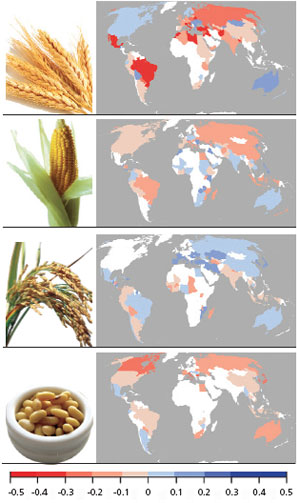 Estimated impact of climate change on crop production during 1980-2008. Negative values indicate climate change reduced yields
Estimated impact of climate change on crop production during 1980-2008. Negative values indicate climate change reduced yields
There have been many indicators that global warming could be hurting the world food production, lowering yields and increasing prices. Turns out the warming of the planet over the past three decades has already led to a measurable reduction in crop production of wheat and maize.
Economic and Political Weekly 2011: Review of Agriculture (June 25 - July 8, 2011)
Posted on 28 Jul, 2011 02:25 PM
Issue: VOL 46 No. 26 and 27 Jun 25 - July 08, 2011
Review of Agriculture
Irrigation in Telangana: The Rise and Fall of Tanks
Gautam Pingle
The changing Himalayas - Impact of climate change on water resources and livelihoods in the Greater Himalayas – A report by ICIMOD
Posted on 27 Jul, 2011 09:56 PM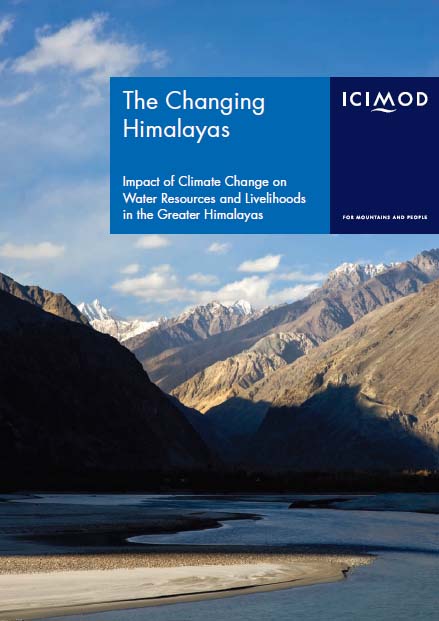 The greater Himalayan region “the roof of the world” – contains the most extensive and rugged high altitude areas on Earth, and the largest areas covered by glaciers and permafrost outside the polar regions.
The greater Himalayan region “the roof of the world” – contains the most extensive and rugged high altitude areas on Earth, and the largest areas covered by glaciers and permafrost outside the polar regions.
Perspectives on poverty in India - Stylized facts from survey data – A report by World Bank
Posted on 26 Jul, 2011 04:38 PM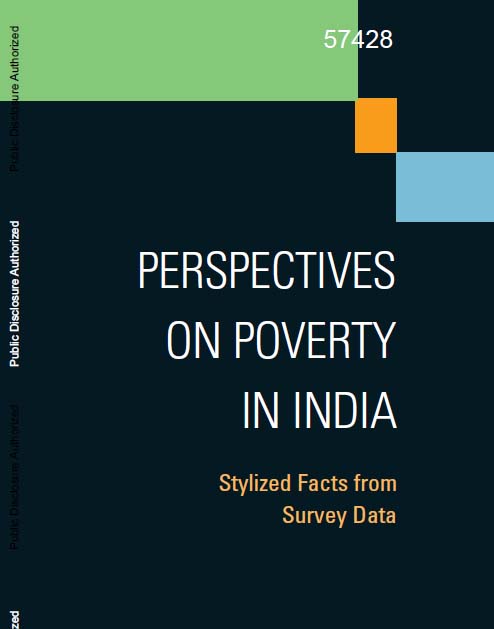 It produces a diagnosis of the broad nature of the poverty problem and its trends in India, focusing on both consumption poverty and human development outcomes.
It produces a diagnosis of the broad nature of the poverty problem and its trends in India, focusing on both consumption poverty and human development outcomes.
It also includes attention in greater depth to three pathways important to inclusive growth and poverty reduction harnessing the potential of urban growth to stimulate rural-based poverty reduction, rural diversification away from agriculture, and tackling social exclusion.
The political economy of sanitation - How can we increase investment and improve service for the poor? – A report by Water and Sanitation Program
Posted on 26 Jul, 2011 02:53 PM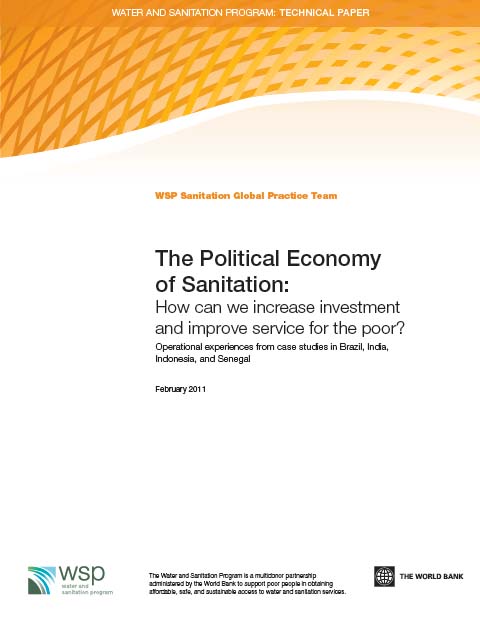 This global study attempts systematically to understand and thus help practitioners manage the political economy of pro-poor sanitation investments and service provision.
This global study attempts systematically to understand and thus help practitioners manage the political economy of pro-poor sanitation investments and service provision.
It aims to provide practical advice to multi-lateral agencies and sanitation practitioners to help them better manage stakeholder relations and effectively maneuver within the complex institutional relationships of the sanitation sector in order to enhance the design, implementation, and effectiveness of operations that provide pro-poor sanitation investments and services. The ultimate goal is to improve health and hygiene outcomes.
This study follows current approaches to political economy - interdisciplinary inquiry drawing upon social and political theory and economic principles - to understand how political actors, institutions, and economic processes influence each other. This study’s conceptual framework combines a diagnostic component with a typology of actions to help translate analytical findings into more effective support to operations and investments.